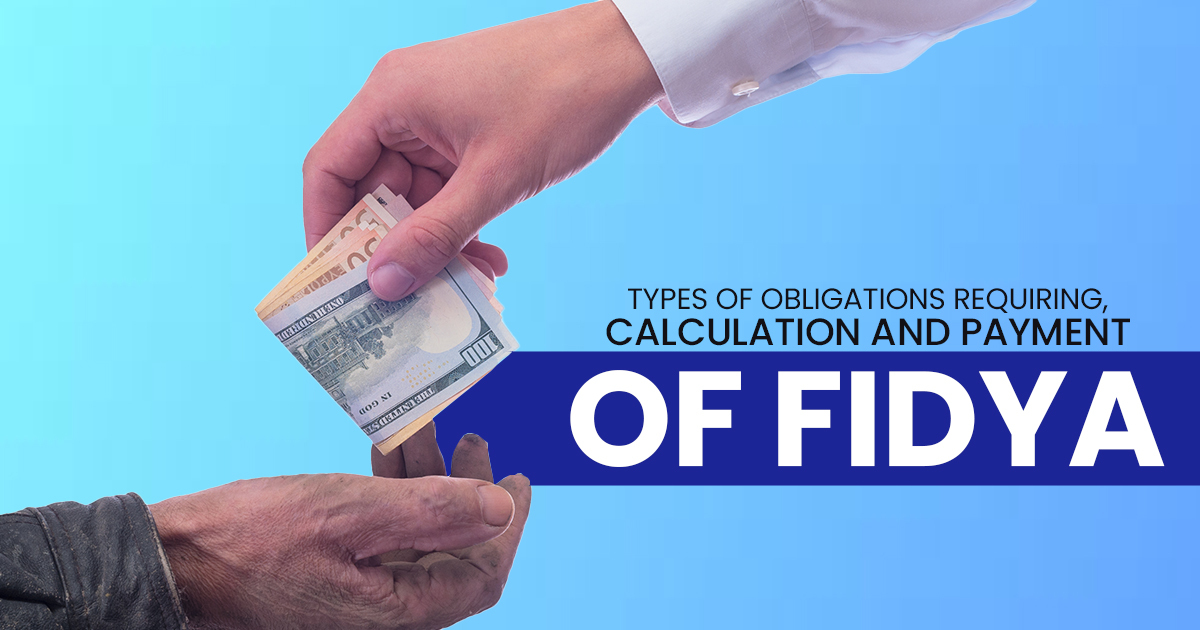We use cookies to make your experience better. To comply with the new e-Privacy directive, we need to ask for your consent to set the cookies. Learn more.
Types of Obligations Requiring, Calculation and Payment of Fidya

Types of Obligations Requiring, Calculation and Payment of Fidya
In Islamic jurisprudence, fidya serves as a form of compensation for certain missed religious obligations. It is a significant aspect of Islamic practice, ensuring that individuals can fulfill their religious duties even in exceptional circumstances.
This comprehensive blog by Darussalam aims to delve into the various types of obligations requiring, calculating, and paying fidya, providing clarity on this crucial concept in Islam.
Defining Fidya:
Fidya, a term originating from the Arabic word "fadaa," holds paramount importance in Islamic jurisprudence. It serves as a means of compensating for missed religious obligations due to various unavoidable circumstances. This concept ensures that individuals can fulfill their spiritual duties even when faced with challenges such as illness, old age, or other impediments. Fidya embodies the principles of mercy, compassion, and equity, facilitating the practice of Islam in diverse situations.
1. Compensation for Missed Obligations: Fidya acts as compensation for missed religious duties, allowing individuals to fulfill their spiritual responsibilities despite challenges.
2. Ensuring Continuity of Practice: By providing a mechanism for compensating missed obligations, fidya ensures the continuity of religious practice even in adverse situations.
3. Embodying Principles of Compassion: Fidya reflects Islam's emphasis on compassion and equity, allowing individuals to maintain their spiritual commitment while acknowledging their limitations.
Types of Obligations Requiring Fidya:
In Islamic practice, various obligations may necessitate the payment of fidya as compensation for their non-performance or invalidation due to legitimate reasons.
Fasting (Sawm):
Individuals who are unable to fast during the month of Ramadan due to reasons such as illness or pregnancy are obligated to pay fidya.
The payment is made for each missed day of fasting.
Prayer (Salah):
Those who are incapable of performing their daily prayers due to illness or physical incapacitation are required to pay fidya.
Fidya is calculated for each missed prayer.
Hajj and Umrah:
Individuals who are physically incapable or financially unable to perform Hajj or Umrah are obligated to pay fidya as a substitute.
The amount of fidya varies based on circumstances and is paid instead of the pilgrimage.
Read More: What is Fidya in Islam?
Calculating Fidya:
The calculation of fidya varies depending on the obligation and the individual's circumstances. However, the general principle involves determining the equivalent of the missed obligation in terms of monetary value. Here's a basic outline for calculating fidya.
Paying Fidya:
Fidya payments are essential in fulfilling missed religious obligations and ensuring the continuity of spiritual practice despite unavoidable circumstances. When making fidya payments, it is crucial to adhere to certain guidelines to ensure that the compensation reaches deserving recipients and serves its intended purpose effectively.
1. Identification of Deserving Recipients: It is vital to identify individuals or organizations that are eligible to receive fidya payments, such as the poor, needy, or charitable organizations facilitating distribution.
2. Transparency in Payment Process: Ensuring transparency in the payment process is essential to guarantee that fidya funds are utilized appropriately and reach those in need without any mismanagement.
3. Alignment with Religious Principles: Fidya payments should be made by religious teachings and under the guidance of knowledgeable religious authorities to ensure adherence to Islamic principles and practices.
Learn More: Significance of Fitrana in Islam
Conclusion:
Understanding the types of obligations requiring, calculating, and paying fidya is essential for adherents of Islam. By fulfilling fidya obligations, individuals can maintain their spiritual commitment even in challenging circumstances, ensuring that they remain connected to their faith. Through proper calculation and payment of fidya, believers can uphold the principles of compassion, charity, and social responsibility embedded within Islamic teachings.
FAQs About Types of Obligations Requiring, Calculation and Payment of Fidya:
What is the purpose of fidya in Islam?
Fidya serves as a form of compensation for individuals who are unable to fulfill certain religious obligations due to valid reasons, ensuring that they can still maintain their spiritual commitment.
Who is eligible to pay fidya?
Individuals who are unable to perform specific religious duties due to reasons such as illness, old age, or other valid excuses are obligated to pay fidya.
Can fidya be paid in advance?
Yes, in certain circumstances, fidya can be paid in advance for anticipated missed obligations, such as fasting during Ramadan for individuals with chronic illnesses.
Are there any exceptions to paying fidya?
Fidya is generally obligatory for missed religious duties; however, exemptions may apply in cases of extreme poverty or other exceptional circumstances.
How can one ensure their fidya payment reaches deserving recipients?
It is advisable to make fidya payments through reputable charitable organizations or directly to needy individuals under the guidance of knowledgeable religious authorities, ensuring transparency and accountability in the distribution process.

 United Kingdom
United Kingdom United Arab Emirates
United Arab Emirates Pakistan
Pakistan
















